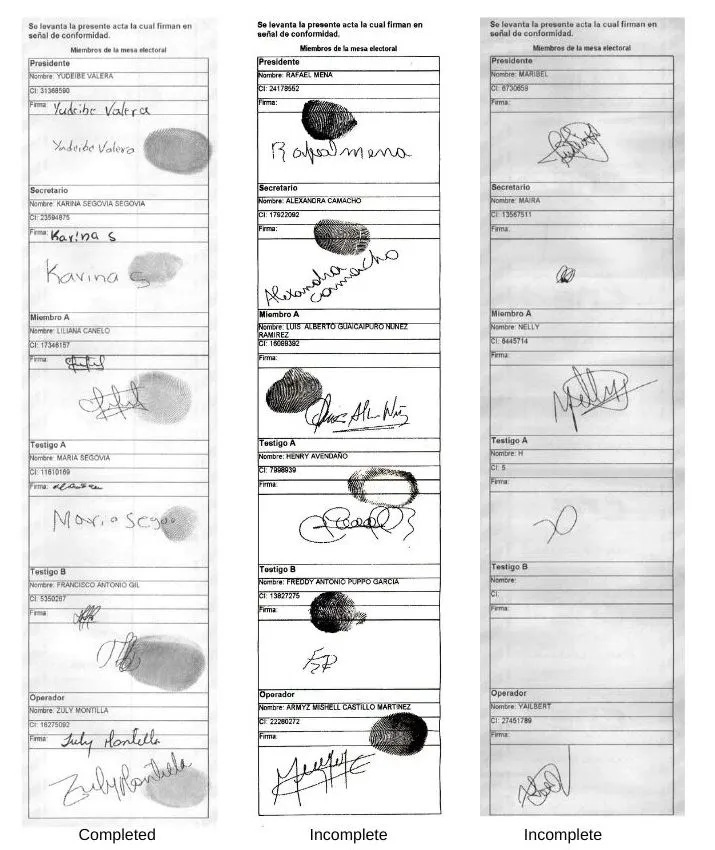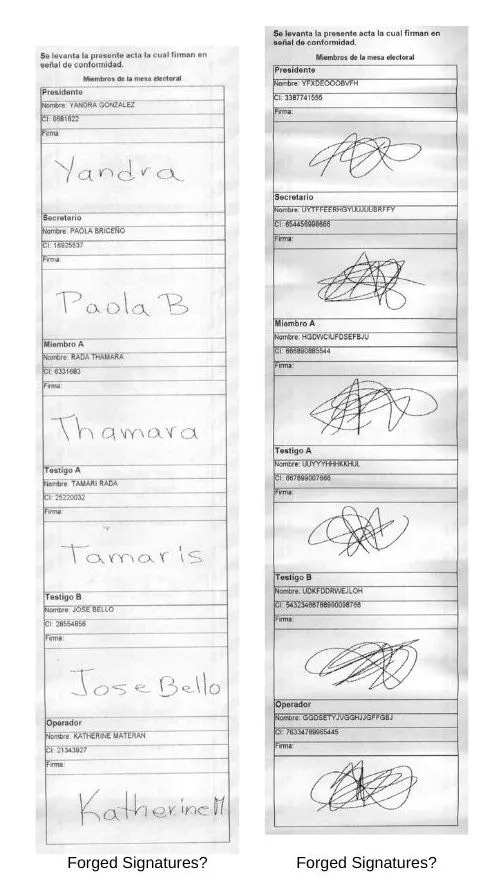Venezuela Is About To Be Back In U.S. News In a Big Way
It should serve as a reminder that the Venezuelan opposition led by María Corina Machado failed to prove Edmundo González won the election

It’s not unheard of for the United States to get involved in other countries' elections to swing them in a way that serves U.S. corporate interests. The election in Venezuela over the summer appears to be another one of these cases. While much was made about the publicly available data presented by María Corina Machado’s opposition, the group failed to prove anything.
Instead, they offered precinct-level tally sheets that could not be authenticated due to various anomalies including forged signatures and fake names with more than 90% not certified. Certification of the precinct-level data makes the electoral system in Venezuela one of the most secure in the world. The process requires comparing election workers’ thumbprints and inked signatures with their digitally stored versions, which most tally sheets did not show.

While many point to the two U.S. media outlets that were offered the data before anyone else, as I’ve previously covered, neither the Associated Press nor the Washington Post could validate the authenticity of the opposition’s data. After two months of analysis, I uncovered why no one could (see links below). Looking at the history of U.S. interventions in Venezuela's elections over the last 25 years shows that this tactic is not an unfamiliar one – it has been tried before.
“The AP could not independently verify the authenticity of the 24,532 tally sheets provided by the opposition. The AP successfully extracted data from 96% of the provided vote tallies, with the remaining 4% of images too poor to parse.”
Even with a lack of validation, the U.S. Department of State (State) began a political campaign in the media alleging opposition candidate Edmundo González won the election. Initially, State spokespersons pointed to the AP and Post reports as evidence. However, when I asked if they had any additional information that validated those reports, State began backtracking and instead called for Nicolás Maduro to produce proof of his victory.
The Venezuelan government has not provided precinct-level data.
The system of certifying a Venezuelan election employs myriad procedures to ensure accuracy when counting votes and verifying the counts. Another aspect of the certification process allows all parties to audit the data and provide their results to the Venezuela Supreme Court of Justice which validated Maduro’s victory. All but one opposition candidate’s campaign verified Maduro’s electoral win. González’s campaign refused to participate in the process.

González’s lawyer later distanced himself from the opposition party’s claims and the data and claimed that Machado’s team did not let him participate in the certification process. Within days, González distanced himself from the data claiming he had nothing to do with creating the images of the tally sheets or uploading them to the web. Afterward, we began to see people like Erik Prince (of Blackwater fame) call for a violent coup and start a fundraising effort to raise $100 million (his fee) to overthrow the Venezuelan government.
Within weeks, the Venezuelan government made several arrests of foreigners entering the country and intercepted multiple shipments of U.S. military weapons. It wasn’t until then that Machado claimed to have gone into hiding — but was still holding public rallies in Caracas — as rumors swirled about her trying to recruit people along the Colombia-Venezuela border to assist her in a violent overthrow of the Venezuelan government.
Now, after all of these failures by U.S.-backed actors in the country, Venezuela is set to host its presidential inauguration on January 10. This will again bring the country into the news for most people in the United States. State and the White House along with Trump appointees like Marco Rubio will presumably make various inflammatory declarations. The news media will likely repeat those assertions without highlighting why the opposition’s data can’t be validated.
Meanwhile, Venezuela issued a new warrant for González should he be found in the country after Nicolás Maduro intervened to lift a previous warrant and grant him safe passage to Spain earlier this year. González is currently on a tour of several Latin American nations and met with President Joe Biden which he said was fruitful. He also declared that he’s been in contact with President-elect Trump and expects their relationship to be close. González vowed to be in the country for the presidential inauguration but offered no clear plans.
“President Biden reiterated his support for Venezuela’s democratic aspirations and underscored the U.S. commitment to continue to hold Maduro and his representatives accountable for their anti-democratic and repressive actions, including by working closely with democratic allies in the hemisphere and around the world,” reads a White House statement.
What happens moving forward is anyone’s guess with a new administration coming to power and a much more fascistic cabinet. While the U.S. fails to acknowledge the violence led by Machado’s opposition that killed dozens in the days after the election and led to many arrests, they will accuse the government, like they often do with Cuba, of using repressive tactics to silence dissent.
The truth is that there are many opposition party members in Venezuela’s government but they never talk about it. If they did, it would undermine myriad false narratives.
The focus for the U.S. remains on manufacturing consent to access Venezuela’s resources by force. On Sunday, González called for the Venezuelan military to recognize him as president-elect in a video post on X (formerly Twitter) and Macahdo’s opposition party has organized protests for Thursday.
Despite all of the rhetoric from Machado’s opposition party and the U.S. government, major media outlets such as the AP and Reuters have their doubts about González winning — noted by the language used in their reporting. While U.S. news outlets have a lean that suggests they’re towing State’s line, they stop short of making any declarations due to doubts about the authenticity of the data.
Casting even more doubt about González’s alleged victory is Machado’s involvement in many coups over the last two decades and Gonzalez’s history of coordinating the capture, torture, disappearance, and murder of revolutionaries in El Salvador. The U.S. was directly involved with the Venezuelan government at the time and was responsible for the killing of Jesuit priests, revolutionaries, and countless civilians in El Salvador and across Latin America. This occurred as part of now-declassified Operation Condor under former president Reagan.
This history combined with Machado’s far-right party policy proposals to privatize everything — as Argentina did and poverty exploded to 53% — makes their far-right platform highly unpopular in Venezuela. Support for Maduro in Venezuela is far too great to pretend it doesn’t exist as U.S. news media so often does.
My Reporting On the Venezuelan Election
Everything mentioned in this article is documented in my work below, including María Corina Machado admitting that her team of hackers spent months putting this scheme together.
I’m a freelance journalist. Find my work at Latino Rebels, Unicorn Riot, The Antagonist Magazine, and more. To support my work, consider becoming a paid subscriber or donate on Venmo, PayPal, or CashApp










Thank you for your reporting, Arturo!
“Operation Condor under former president Reagan… combined with Machado’s far-right party policy proposals to privatize everything — as Argentina did and poverty exploded to 53% — makes their far-right platform highly unpopular in Venezuela” just about summarizes the history of the Americas since 1776. What’s surprising is that all the militaries haven’t become vassal states of Washington despite the human rights violations of sanctions.